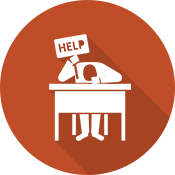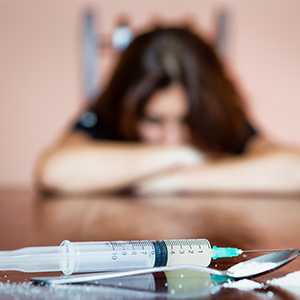- How Often Does This Happen?
- Substance Abuse May Cause Mental Illness
- Substance Abuse May Be an Attempt to Escape the Symptoms of Mental Illness
- Substance Abuse and Mental Illness Share a Common Cause
- Substance Abuse and Mental illness Maintain Each Other
- Sources
- How Often Does This Happen?
- Substance Abuse May Cause Mental Illness
- Substance Abuse May Be an Attempt to Escape the Symptoms of Mental Illness
- Substance Abuse and Mental Illness Share a Common Cause
- Substance Abuse and Mental illness Maintain Each Other
- Sources
How Are They Related?
Mental illness and substance use disorders share a strong connection. These two categories of disorders:
- Tend to co-occur together more often than what could be attributed to chance.
- Affect each other significantly.
Presence of a mental illness and substance use in the same person poses multiple challenges for everyone involved with the addiction treatment process -- the affected individual and family, mental and medical health professionals as well as other caregiving staff.
How Often Does This Happen?
Quite often. General population based studies have established high prevalence rates of substance use disorders among individuals suffering from psychiatric disorders.

Similarly, persons with a substance use disorder are more likely to experience a psychiatric condition.

As compared to the general population, the individuals with drug use disorders are twice as likely to suffer from a mood or anxiety disorder.

Similarly, the individuals with a mood or anxiety disorder are twice as likely to suffer from a drug use disorder.
Two of the largest population-based mental health surveys in the USA found that up to 37% and 53% of the respondents with alcohol use disorder and drug use disorders, respectively, had at least one comorbid psychiatric disorder.
- Also, a comorbid substance use disorder was observed in:
- 24% of individuals with anxiety disorder.
- 32% of individuals with mood disorder.
- 47% of individuals with schizophrenia.
- 84% individuals with personality disorders.
- Marijuana dependence frequently co-occurs with other forms of substance use, primarily, alcohol and cocaine.
- Co-occurrence of psychiatric disorders and substance use disorders may be even higher among incarcerated individuals and those in treatment centers.
Presence of a mental illness and substance use in the same person poses multiple challenges for everyone involved with the addiction treatment process -- the affected individual and family, mental and medical health professionals as well as other caregiving staff.
Substance Abuse May Cause Mental Illness
1. It has been observed that abuse of psychoactive substances, especially if excessive and/or prolonged, can lead to the emergence of psychiatric disorders.
Cannabis use has been associated with an increased risk of psychotic disorders in a dose-dependent manner.
2. Additionally, psychiatric symptoms can emerge during multiple stages of use - like extreme intoxication and withdrawal - from certain psychoactive substances.
- There is evidence to support that the use of certain psychoactive substances can trigger the underlying biological vulnerability for psychiatric disorders.
- Such observations have been made in the genetic and biochemical studies that have explored the underlying mechanisms of emergence of psychiatric disorders among individuals with drug use disorders.
3. Additionally, the mental health complications associated with alcohol and drug use could act as a stressor and contribute to the emergence of psychiatric issues like depressive disorder and anxiety disorders.
- It has been documented that use of alcohol and other drugs can worsen the psychiatric symptoms and even induce re-emergence of the symptoms among those who are in remission.
Substance Abuse May Be an Attempt to Escape the Symptoms of Mental Illness
The self-medication hypothesis of drug use among patients with psychiatric disorders states that individuals with psychiatric disorders may attempt to reduce their 'tension' by using psychoactive substances.
- For example, those with social anxiety disorders may resort to alcohol use in order to address the anxiety experienced while interacting with others.
- Similarly, individuals experiencing distressing symptoms such as auditory hallucinations may use substances to avoid the distress.
- Some individuals also report the use of psychoactive substances in order to manage the adverse effects associated with psychiatric medicines prescribed for the treatment of the underlying mental health condition.
- Self-medication in anxiety disorders has been associated with a substantial risk of developing a substance use disorder.
If you or someone you love is suffering from a mental health condition that has caused their drug use to spiral out of control, or alternatively, drug use is causing depression or anxiety, you need help today. Our treatment support providers can help you find a treatment program that addresses both conditions simultaneously,
please call
1-888-993-3112Who Answers?.
Substance Abuse and Mental Illness Share a Common Cause
There is a growing body of evidence that suggests that psychiatric disorders and substance use disorders might share a common etiology.

It has been postulated that
common genetic factors might be shared across the psychiatric disorders and substance use disorders.
For example, a common genetic susceptibility may explain dopamine dysregulation in substance abuse and mental illness.

Various
environmental factors are also shared across psychiatric disorders and substance use disorders.
Early childhood trauma, stress and early exposure to psychoactive substances have been identified as predisposing factors for both psychiatric disorders and substance use disorders.

Similar brain regions have also been implicated in the development of psychiatric disorders and substance use disorders.
Neurological mechanisms involved in stress response and dopaminergic regulation have been identified as precipitating factors in both psychiatric disorders and substance use disorders.
Substance Abuse and Mental illness Maintain Each Other
While psychiatric disorders and substance use disorders can co-occur as independent disorders in the same individual, in a subset of a dually diagnosed population these two sets of disorders also contribute to the maintenance of each other.
- As mentioned, theory would predict that those with a psychiatric disorder may resort to substance use as self-medication.
- However, the excessive and prolonged use of the psychoactive substance can then contribute to sustenance or relapse of a psychiatric disorder.
Similarly, the psychiatric issues that emerge consequent to the use of a psychoactive substance can then lead to reinforce continued or even excessive use of the psychoactive substance.
- For example, an individual with an anxiety disorder may resort to alcohol use to handle the distressing anxiety.
- The regular and excessive use of alcohol can subsequently progress to abuse and even dependence.
- In such a situation the individual will experience more anxiety features during the phases of withdrawal which will lead to reuse of alcohol.
Sources
- Comorbid Drug Abuse and Mental Illness- A Research Update from the National Institute on Drug Abuse. National Institutes of Health, U.S. Department of Health and Human Services 2007.
- Kessler RC, Nelson CB, McGonagle KA, Edlund MJ, Frank RG, Leaf PJ. The epidemiology of co-occurring addictive and mental disorders: implications for prevention and service utilization. Am J Orthopsychiatry. 1996 Jan;66(1):17-31.
- Regier DA, Farmer ME, Rae DS, Locke BZ, Keith SJ, Judd LL, et al. Comorbidity of mental disorders with alcohol and other drug abuse. Results from the Epidemiologic Catchment Area (ECA) Study. JAMA. 1990 Nov 21;264(19):2511-8.
- Moore TH, Zammit S, Lingford-Hughes A, Barnes TR, Jones PB, Burke M, et al. Cannabis use and risk of psychotic or affective mental health outcomes: a systematic review. Lancet. 2007 Jul 28;370(9584):319-28.
- Hall W, Degenhardt L. Cannabis use and the risk of developing a psychotic disorder. World Psychiatry. 2008;7(2):68-71.
- Robinson J, Sareen J, Cox BJ, Bolton JM. Role of self-medication in the development of comorbid anxiety and substance use disorders: a longitudinal investigation. Arch Gen Psychiatry. 2011 Aug;68(8):800-7.
- Volkow ND. Substance use disorders in schizophrenia--clinical implications of comorbidity. Schizophr Bull. 2009 May;35(3):469-72.
- How Often Does This Happen?
- Substance Abuse May Cause Mental Illness
- Substance Abuse May Be an Attempt to Escape the Symptoms of Mental Illness
- Substance Abuse and Mental Illness Share a Common Cause
- Substance Abuse and Mental illness Maintain Each Other
- Sources
- How Often Does This Happen?
- Substance Abuse May Cause Mental Illness
- Substance Abuse May Be an Attempt to Escape the Symptoms of Mental Illness
- Substance Abuse and Mental Illness Share a Common Cause
- Substance Abuse and Mental illness Maintain Each Other
- Sources
How Are They Related?
Mental illness and substance use disorders share a strong connection. These two categories of disorders:
- Tend to co-occur together more often than what could be attributed to chance.
- Affect each other significantly.
Presence of a mental illness and substance use in the same person poses multiple challenges for everyone involved with the addiction treatment process -- the affected individual and family, mental and medical health professionals as well as other caregiving staff.
How Often Does This Happen?
Quite often. General population based studies have established high prevalence rates of substance use disorders among individuals suffering from psychiatric disorders.

Similarly, persons with a substance use disorder are more likely to experience a psychiatric condition.

As compared to the general population, the individuals with drug use disorders are twice as likely to suffer from a mood or anxiety disorder.

Similarly, the individuals with a mood or anxiety disorder are twice as likely to suffer from a drug use disorder.
Two of the largest population-based mental health surveys in the USA found that up to 37% and 53% of the respondents with alcohol use disorder and drug use disorders, respectively, had at least one comorbid psychiatric disorder.
- Also, a comorbid substance use disorder was observed in:
- 24% of individuals with anxiety disorder.
- 32% of individuals with mood disorder.
- 47% of individuals with schizophrenia.
- 84% individuals with personality disorders.
- Marijuana dependence frequently co-occurs with other forms of substance use, primarily, alcohol and cocaine.
- Co-occurrence of psychiatric disorders and substance use disorders may be even higher among incarcerated individuals and those in treatment centers.
Presence of a mental illness and substance use in the same person poses multiple challenges for everyone involved with the addiction treatment process -- the affected individual and family, mental and medical health professionals as well as other caregiving staff.
Substance Abuse May Cause Mental Illness
1. It has been observed that abuse of psychoactive substances, especially if excessive and/or prolonged, can lead to the emergence of psychiatric disorders.
Cannabis use has been associated with an increased risk of psychotic disorders in a dose-dependent manner.
2. Additionally, psychiatric symptoms can emerge during multiple stages of use - like extreme intoxication and withdrawal - from certain psychoactive substances.
- There is evidence to support that the use of certain psychoactive substances can trigger the underlying biological vulnerability for psychiatric disorders.
- Such observations have been made in the genetic and biochemical studies that have explored the underlying mechanisms of emergence of psychiatric disorders among individuals with drug use disorders.
3. Additionally, the mental health complications associated with alcohol and drug use could act as a stressor and contribute to the emergence of psychiatric issues like depressive disorder and anxiety disorders.
- It has been documented that use of alcohol and other drugs can worsen the psychiatric symptoms and even induce re-emergence of the symptoms among those who are in remission.
Substance Abuse May Be an Attempt to Escape the Symptoms of Mental Illness
The self-medication hypothesis of drug use among patients with psychiatric disorders states that individuals with psychiatric disorders may attempt to reduce their 'tension' by using psychoactive substances.
- For example, those with social anxiety disorders may resort to alcohol use in order to address the anxiety experienced while interacting with others.
- Similarly, individuals experiencing distressing symptoms such as auditory hallucinations may use substances to avoid the distress.
- Some individuals also report the use of psychoactive substances in order to manage the adverse effects associated with psychiatric medicines prescribed for the treatment of the underlying mental health condition.
- Self-medication in anxiety disorders has been associated with a substantial risk of developing a substance use disorder.
If you or someone you love is suffering from a mental health condition that has caused their drug use to spiral out of control, or alternatively, drug use is causing depression or anxiety, you need help today. Our treatment support providers can help you find a treatment program that addresses both conditions simultaneously,
please call
1-888-993-3112Who Answers?.
Substance Abuse and Mental Illness Share a Common Cause
There is a growing body of evidence that suggests that psychiatric disorders and substance use disorders might share a common etiology.

It has been postulated that
common genetic factors might be shared across the psychiatric disorders and substance use disorders.
For example, a common genetic susceptibility may explain dopamine dysregulation in substance abuse and mental illness.

Various
environmental factors are also shared across psychiatric disorders and substance use disorders.
Early childhood trauma, stress and early exposure to psychoactive substances have been identified as predisposing factors for both psychiatric disorders and substance use disorders.

Similar brain regions have also been implicated in the development of psychiatric disorders and substance use disorders.
Neurological mechanisms involved in stress response and dopaminergic regulation have been identified as precipitating factors in both psychiatric disorders and substance use disorders.
Substance Abuse and Mental illness Maintain Each Other
While psychiatric disorders and substance use disorders can co-occur as independent disorders in the same individual, in a subset of a dually diagnosed population these two sets of disorders also contribute to the maintenance of each other.
- As mentioned, theory would predict that those with a psychiatric disorder may resort to substance use as self-medication.
- However, the excessive and prolonged use of the psychoactive substance can then contribute to sustenance or relapse of a psychiatric disorder.
Similarly, the psychiatric issues that emerge consequent to the use of a psychoactive substance can then lead to reinforce continued or even excessive use of the psychoactive substance.
- For example, an individual with an anxiety disorder may resort to alcohol use to handle the distressing anxiety.
- The regular and excessive use of alcohol can subsequently progress to abuse and even dependence.
- In such a situation the individual will experience more anxiety features during the phases of withdrawal which will lead to reuse of alcohol.
Sources
- Comorbid Drug Abuse and Mental Illness- A Research Update from the National Institute on Drug Abuse. National Institutes of Health, U.S. Department of Health and Human Services 2007.
- Kessler RC, Nelson CB, McGonagle KA, Edlund MJ, Frank RG, Leaf PJ. The epidemiology of co-occurring addictive and mental disorders: implications for prevention and service utilization. Am J Orthopsychiatry. 1996 Jan;66(1):17-31.
- Regier DA, Farmer ME, Rae DS, Locke BZ, Keith SJ, Judd LL, et al. Comorbidity of mental disorders with alcohol and other drug abuse. Results from the Epidemiologic Catchment Area (ECA) Study. JAMA. 1990 Nov 21;264(19):2511-8.
- Moore TH, Zammit S, Lingford-Hughes A, Barnes TR, Jones PB, Burke M, et al. Cannabis use and risk of psychotic or affective mental health outcomes: a systematic review. Lancet. 2007 Jul 28;370(9584):319-28.
- Hall W, Degenhardt L. Cannabis use and the risk of developing a psychotic disorder. World Psychiatry. 2008;7(2):68-71.
- Robinson J, Sareen J, Cox BJ, Bolton JM. Role of self-medication in the development of comorbid anxiety and substance use disorders: a longitudinal investigation. Arch Gen Psychiatry. 2011 Aug;68(8):800-7.
- Volkow ND. Substance use disorders in schizophrenia--clinical implications of comorbidity. Schizophr Bull. 2009 May;35(3):469-72.

![]()
![]()
![]()
![]()
